Recap of 48th IT Press Tour in California
With 8 companies: Amberflo, CloudFabrix, HYCU, Pulumi, RobinIO, Solo.io, Sysdig and project Velero
By Philippe Nicolas | February 15, 2023 at 2:00 pmBy Philippe Nicolas, organizer of the event
The recent 48th edition of The IT Press Tour in California was the opportunity to meet 8 companies playing in cloud, AIOps, IT infrastructure, data management, storage and security: Amberflo, CloudFabrix, HYCU, Pulumi, RobinIO, Solo.io, Sysdig and project Velero.
Amberflo
Founded in 2020 by past AWS leaders having created key cloud services, it targets the cloud pricing and billing aspect with a usage-based pricing and billing model. It represents a significant complex problem to solve in order to reflect exactly the consumption of the various cloud services. All of this starts with a fine grain metering data collection backend coupled within a dedicated data infrastructure. This finally became the real backbone for cloud operations. Metering is key and must be comprehensive without omitting any CPU cycles, API calls or transactions. The team has designed, built and developed a metering platform with billing as the first application of it. The solution is capable of collecting billions of records from all tiers of applications or any IT resources to show real consumption to establish this usage-based pricing. The engineering group has built its own time-series database to be able to receive all the huge data flow stored on AWS S3. It turns out that this initiative represents the next wave of software billing beyond classic licenses and subscriptions.
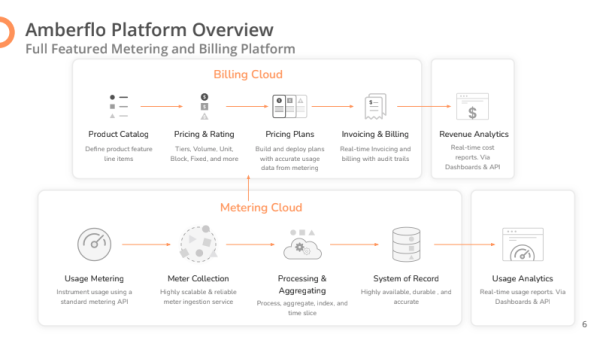
CloudFabrix
Founded in 2015 with $24.5 million raised so far a pending new round soon, it plays in the AIOps domain. The founding team with Raju Datla, Bhaskar Krishnamsetty, Satyan Raju and Raju Penmetsa, already created Jahi Networks, Pari Networks and Cloupia, all sold to Cisco. AIOps means applications analytics and intelligence leveraging AI for large scale environments to deliver insights for IT operations. The ultimate goal would be to make the enterprise fully autonomous as it becomes more and more complex leveraging data, AI and automation. CloudFabrix has designed, built and developed a rich data-centric AIOps platform with the Robotic Data Automation Fabric aka RDAF at the heart. CloudFabrix articulates 6 key differentiators with the RDAF platform, the full stack service map, composable dashboards, AI pipeline and ML train and retrain models in a low code/no code approach. The platform serves as a comprehensive and central solution to deliver fine granular information to optimize IT operations with predictive analytics. For the past few months, the company has accelerated on the observability and security data lake with Cloudian, MinIO, Hitachi or Amazon S3 to list a few.
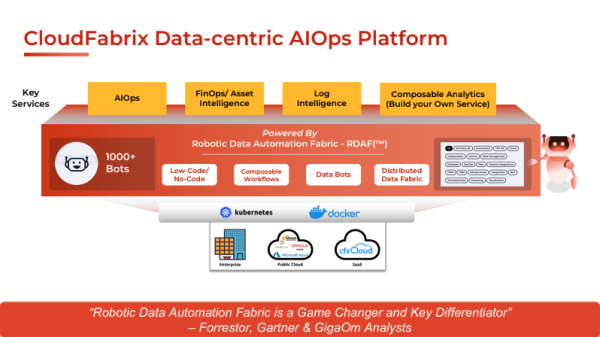
HYCU
It has made a big splash, the launch of R-Cloud, their solution to protect users’ data generated and consumed by SaaS applications. Seen as a big opportunity with already Salesforce, Google Workspace or Microsoft 365 protected and a few others, players has started a real race in that market segment. We see even users jumping into SaaS application without any information about data protection or believing it is included. It should be but it is not and it is a real scandal for SaaS. We understand the PaaS option and the IaaS different requirements. The company has made a significant move in the domain, the idea is to offer, free of charge, to SaaS applications vendors the capability to build their own agent/plug-in/driver/module… thus certified with a low code/no code approach, then managed and orchestrated by HYCU Protégé. The team delivers R-Graph, a topology view of all SaaS applications used by a company to understand their need and things are protected, a marketplace with all available modules and obviously Protégé. The service is charged to enterprises between $1 to $3 per seat per month whatever is the volume of data.
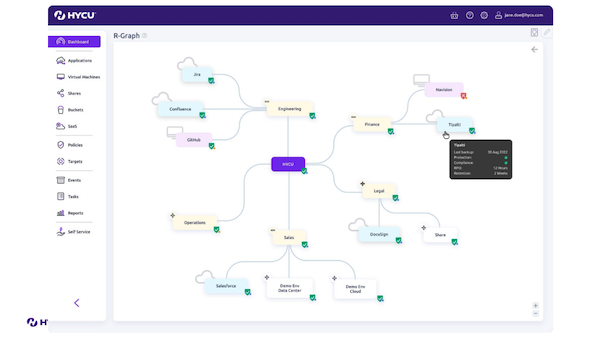
Pulumi
Founded in 2017 in Seattle for $57.5 million raised, it increases its market footprint at a rapid pace with 1,500+ customers and 100,000+ users. It offers designs, builds and develops an infrastructure solution to enable large scale cloud and applications environments, what the industry names Infrastructure as code. This product is free, open source and cloud agnostic working in public and private but also in hybrid mode. Considered as an universal infrastructure as code, the solution is already integrated with lots of partners tools and products like CI/CD solutions. The first value of the company is its universal model avoiding custom developments and integrations that have difficulty to scale and evolve over time. Coupled with Pulumi Service SaaS, the product delivers security features coupled with its openness that makes it a choice for dynamic deployment. Beyond its wide cloud support, the user can use any language to build its own code leveraging best practices templates. API invite users and enterprises to build their own web service, of course their own CLI mode and obviously CI/CD workflows. Globally it confirms that at scale the automation is the most fundamental feature in addition to security.
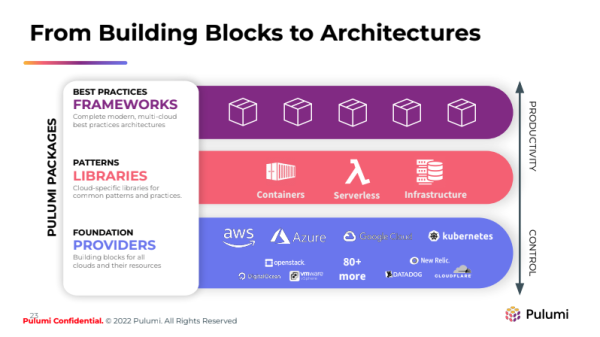
Rakuten Symphony
It jumped into Kubernetes and IT infrastructure with Robin.IO acquisition in April 2022. Partha Seetala, founder of Robin.IO, originally CTO then CEO, became president of the Rakuten Symphony cloud business unit. The current mission is clear with the wish to deliver a distributed stateful edge platform aligned with core – edge – cloud reality on the market. Symworld Cloud, the current Robin.io portfolio at Rakuten Symphony, is iterated under 3 names: Symworld CNP, Symworld CNS and Symworld Orchestrator. Symworld CNP, for cloud-native Platform, is a comprehensive Kubernetes platform that includes networking and storage services for intensive and critical workloads at the edge. CNP runs almost everywhere on Bare-Metal, VM on-premises or in the cloud. Symworld CNS, for cloud-native storage, is a dedicated storage stack for Kubernetes exposing persistent block an file volumes. It delivers storage and data management capabilities for any Kubernetes distribution on any storage infrastructure. Data are protected with strictly consistent replication, HA with split-brain avoidance and functions like snapshot, backup, compression or encryption are also provided.
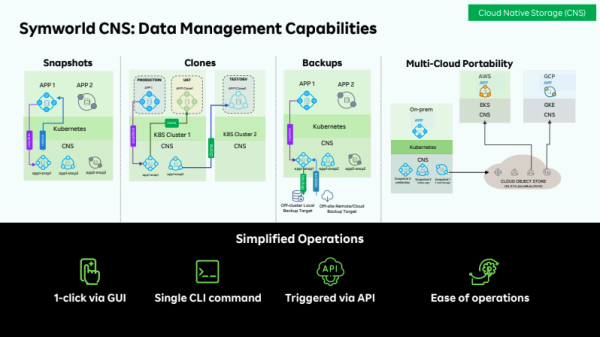
Solo.io
Founded in September 2017 by Idit Levine and based in Cambridge, MA, it has raised so far $171.5 million. The firm is a fast growing player in cloud-native application networking. With digital transformation and wish to scale and modernize their business, enterprises adopt distributed application environments based on micro services orchestrated by Kubernetes. But such choice introduces some challenges with the massive scalability dimension. In that model, applications connectivity and integration require strong API gateway and networking as tons of services, with some maturity differences, need to be coupled together. Solo.io fits in that production environment with its Service Mesh and API Platform. It operates as the micro services glue leveraging Envoy and Istio acting respectively as data and control plane. The team launched Ambient Mesh a few months ago. It is an open source contribution to the Istio project, Solo.io and Google being the lead contributors to the project, with 3 main goals in mind: cost reduction, operations simplification and performance improvement. This implementation delivers fastest traffic across containers between nodes. Built on Istio, the firm has updated GlooMesh to provide a multi-cluster control plane approach.
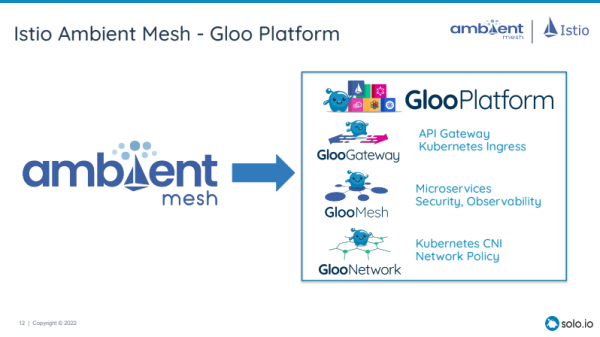
Sysdig
It is a reference in security for micro services and container environments as Falco downloads skyrocket. Founded in 2013 by Loris Degioanni, the company, led today by Suresh Vasudevan, CEO, has raised $750 million. With a clear mission to accelerate and secure cloud innovation from source to run in a loop mode, the firm extends the open source foundation with Sysdig Secure and Sysdig Monitor, dedicated to Kubernetes. Moving to distributed computing model, on-premises or cloud-based, has obviously made clear some issues and difficulties that must be addressed to boost adoption and value. Coupled with machine learning, Secure offers a new level of protection, required in a very dynamic environment with lots of things in-use. The company has also released its annual report, the Sysdig 2023 Cloud-Native Security and Usage Report, where we all learned that the container world is very exposed to threats with very limited access management. The other point of the study unveils that CPU, memory and container usages costs are not controlled at all.
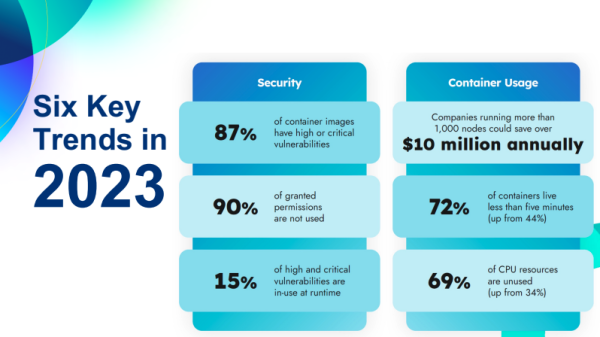
Project Velero
Velero is an open source project with the mission to develop a tool that offers data protection, migration and DR for cloud-native workloads orchestrated by Kubernetes. And we see more and more enterprises moving to these Kubernetes environments, a dedicated data protection becomes a must have. This project is a joint effort from several active vendors such Dell, Kasten, Microsoft, Red Hat and VMware by alpha order. The web site of the project indicated clearly that the project is backed by VMware. Historically, the company landed at VMware in 2018 when the VM leader acquired Heptio. It was known under the Ark name at that time. The tool protects stateful information within Kubernetes cluster such etcd and persistent volumes. Velero has 3 components: a Velero server in the cluster, a CLI client and a Restic deamonset in the cluster as well. The firm relies on the Kubernetes API server to manage correctly etcd data and also cloud provider snapshot but also it could be a file system backup with Restic for instance, then use a data mover function to copy these data to an external object storage for backup images persistence. Velero is embedded in several commercial products such Veritas NetBackup, Dell PowerProtect, VMware, Red Hat and a few others.















 Subscribe to our free daily newsletter
Subscribe to our free daily newsletter

